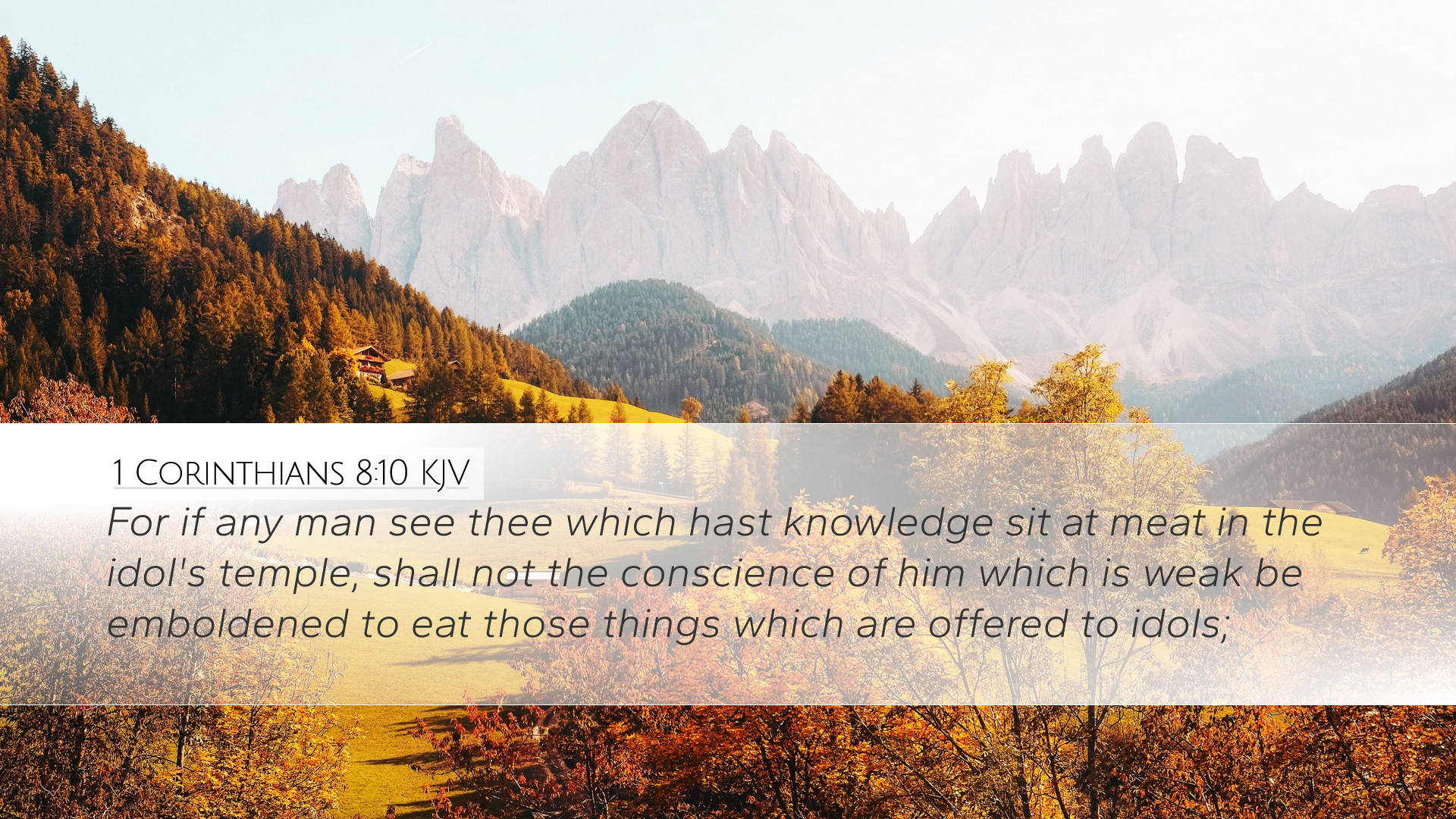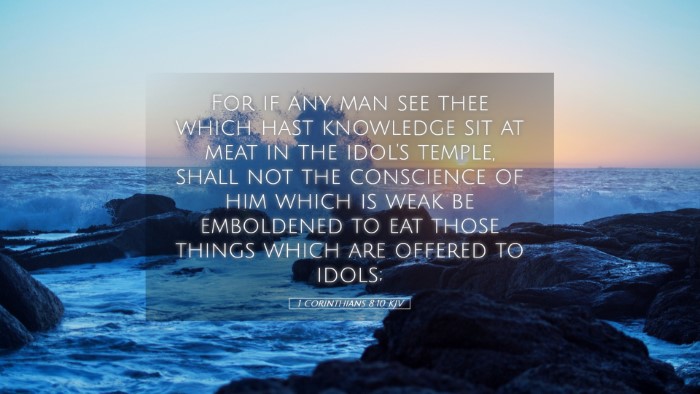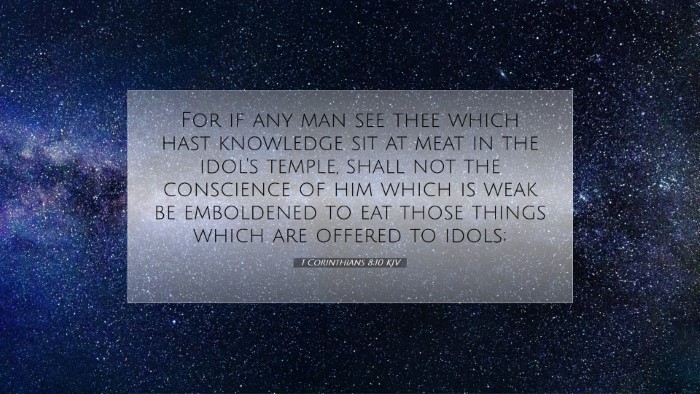Old Testament
Genesis Exodus Leviticus Numbers Deuteronomy Joshua Judges Ruth 1 Samuel 2 Samuel 1 Kings 2 Kings 1 Chronicles 2 Chronicles Ezra Nehemiah Esther Job Psalms Proverbs Ecclesiastes Song of Solomon Isaiah Jeremiah Lamentations Ezekiel Daniel Hosea Joel Amos Obadiah Jonah Micah Nahum Habakkuk Zephaniah Haggai Zechariah Malachi1 Corinthians 8:10
1 Corinthians 8:10 KJV
For if any man see thee which hast knowledge sit at meat in the idol's temple, shall not the conscience of him which is weak be emboldened to eat those things which are offered to idols;
1 Corinthians 8:10 Bible Commentary
Commentary on 1 Corinthians 8:10
1 Corinthians 8:10 states: “For if anyone sees you who have knowledge eating in an idol's temple, will not the conscience of him who is weak be emboldened to eat those things offered to idols?” This verse speaks directly to the issue of Christian liberty and the responsibilities that accompany knowledge.
Contextual Overview
This passage is located within a broader discussion in 1 Corinthians concerning food offered to idols. The Apostle Paul addresses the tensions between the knowledge certain Christians have regarding idols and their understandings of mature Christian freedom versus the potential negative impact on weaker believers.
Insights from Public Domain Commentaries
Matthew Henry's Commentary
Matthew Henry provides significant insights into this verse. He emphasizes the principle of love over knowledge, pointing out that knowledge alone can lead to arrogance (1 Corinthians 8:1). He notes that while a mature believer may comprehend that idols are nothing, this knowledge must be tempered with love and consideration for weaker brethren. Henry highlights that such knowledge can cause weak believers to engage in behaviors that conflict with their conscience, thus leading them into spiritual danger.
The Danger of Knowledge Alone
Henry further elaborates on the potential for a weak conscience to be emboldened. He explains that seeing a knowledgeable believer partake in idol worship may lead a weaker brother to exercise his newly found freedom irresponsibly, potentially jeopardizing his spiritual wellbeing and damaging the community of faith.
Albert Barnes' Notes on the Bible
Albert Barnes provides a detailed analysis of the implications of eating in idol temples. He stresses that the situation being addressed involves not only food but also the spiritual implications of one's actions. Barnes indicates that the act of eating food offered to idols could be seen as an endorsement of idol worship, which could mislead younger or weaker Christians who are still grappling with their understanding of faith.
The Responsibility of the Strong
According to Barnes, those who are strong in faith must act with consideration and prudence. They should not just pursue their rights but also weigh the impact of their decisions on others. He notes that the behavior of a strong believer could inadvertently lead a weaker one ‘back to Egypt,’ dragging them back into idolatrous practices, hence damaging their spiritual journey.
Adam Clarke's Commentary
Adam Clarke complements the discussion by delving into the cultural context of Corinth. He points out that Corinth was rife with idolatry and that certain social situations may compel even strong Christians to confront the less mature followers of Christ. Clarke explains that the sight of a mature believer dining in an idol’s temple may provoke inappropriate actions by those who might see it as permission to indulge in the same practices.
A Passage to Consider for Leadership
Clarke urges that apostolic teachings encourage responsible leadership among believers. He highlights the necessity of guiding others through wisdom and love—not merely through the exercise of knowledge. He states that spiritual leaders should cultivate an environment where the growth of weaker believers is foremost in their actions, avoiding scenarios where their liberties might lead others astray.
Application for Pastors, Students, Theologians, and Bible Scholars
In analyzing 1 Corinthians 8:10, we are faced with a poignant reminder that Christian freedom must be accompanied by love and moral consideration. The weight of this verse lies in its call for maturity, requiring believers to examine both their knowledge and its ramifications:
- Balance Knowledge with Love: This scripture challenges believers to reflect on how their actions resonate in the broader community of faith, reminding us that love must govern our understandings of freedom.
- Considerations in Leadership: Pastors and spiritual leaders should navigate their teaching and conduct with a keen awareness of their audience's maturity levels, setting an example of responsibility and care.
- Fostering Healthy Community: The passage invites believers to engage in honest conversations about personal faith journeys, enabling the community to grow together in maturity without leading one another astray.
Conclusion
1 Corinthians 8:10 serves as a critical exposition on the complexities of Christian liberty, urging followers of Christ to exercise their freedoms with a mindful heart. The collective wisdom from Matthew Henry, Albert Barnes, and Adam Clarke reinforces that our knowledge of scripture should be coupled with genuine love for one another, fostering community growth and avoiding spiritual pitfalls.


